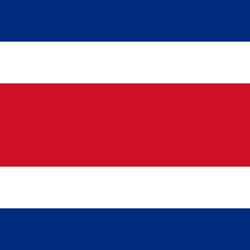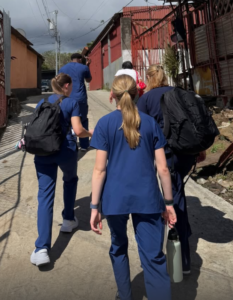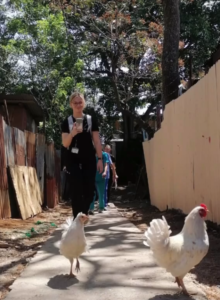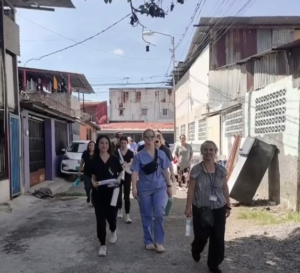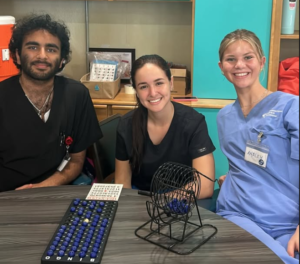About Costa Rica
The phrase “pura vida” literally translated means “pure life,” but its nuanced meaning of “living life to the fullest” is as rich and complex as the country itself. Costa Rica is one of the most bio-diverse and socially-diverse countries in the world. Teeming with life of every kind, Costa Rica is a land of vibrant natural wonder. Its warm and welcoming people and much of its wildlife and ecosystems are found nowhere else. Yet, in the same way that its diverse ecosystems coexist, there are people in great need living among those who have much. In these places of great need, ISL participates in volunteer work led by our Costa Rican staff.
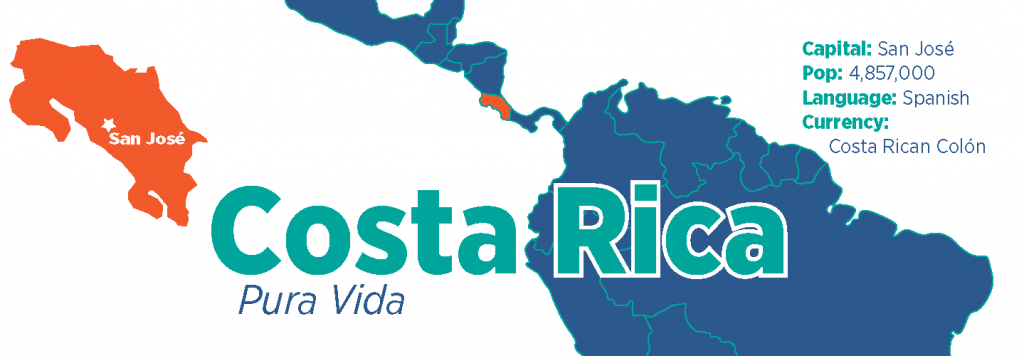
A Brief Overview of Costa Rica
Costa Rica is a Central American country bordered by the Pacific Ocean, the Caribbean Sea, and the countries of Nicaragua, and Panama. Costa Rica has become one of the most stable, democratic, prosperous, and progressive nations in Latin America. It permanently abolished its army in 1949, becoming the first of a very few sovereign nations without a standing army. In fact, one of Costa Rica’s nicknames is “Switzerland of Latin America” because of its neutrality. While Costa Rica is known for its coffee and tropical fruit exports, tourism is now the largest industry. Twenty-five percent of the country’s land area is protected—one of the largest percentages in the world.
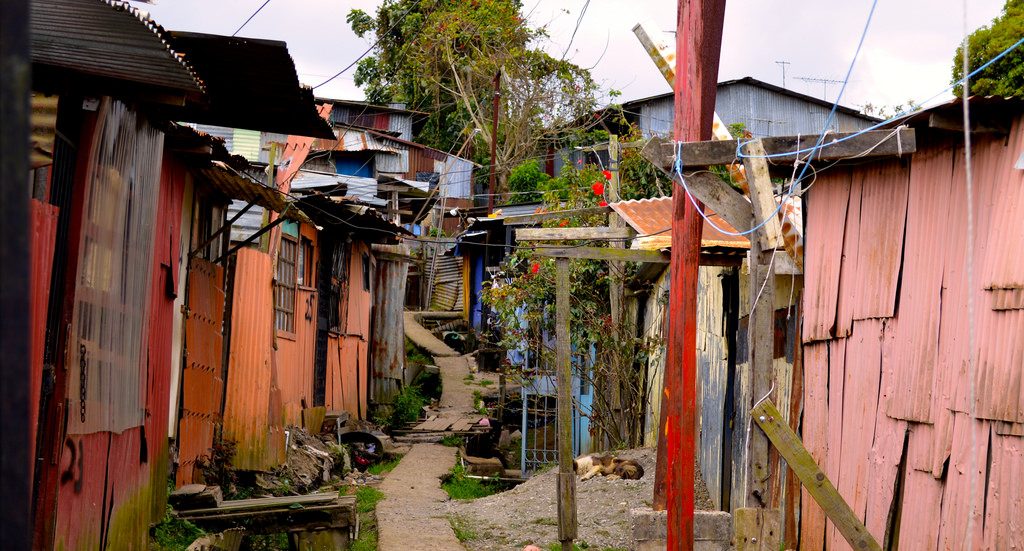
Where We Serve in Costa Rica
ISL works with Costa Rican and Nicaraguan populations within a variety of communities and organizations in Costa Rica. ISL serves rural communities without easy access to urban conveniences and urban “precarios,” where homes are constructed with non-permanent materials. We also serve in nursing homes, homes for disabled persons, and wildlife and environmental conservation centers.
ISL works in all seven provinces of Costa Rica. Many of our partner communities and organizations are located in the Great Metropolitan Areas (GAMs) in the capitals of Cartago, San Jose, Heredia, and Alajuela. Our Hike for Humanity program has been successful in bringing healthcare services to indigenous people in the provinces of Puntarenas and Limón.
The Need in Costa Rica
Costa Rica has a healthcare and social welfare system that, unfortunately, is overwhelmed with the needs of its people. The unemployment rate is very high and there is a large population of immigrants living in poverty. Public and private sector employees and self-employed people who contribute to the economy are the ones who benefit the most from the system.
Our Partnerships
As with any great work, it takes great relationships to get the job done. That’s why ISL Costa Rica has partnered with nonprofits, NGOs, and governmental and religious groups and institutions to better serve the people of Costa Rica.
Children’s Homes
Albergue La Posada de Belén
Desarrollo Humano Vital (DEHVI)
Fundacion Anik Costa Rica
Nursing Homes
Asociación de Atención Integral Tercera Edad Alajuela : Centro Diurno Alajuela AITEA & Albergue Montecillos
Asociación Hogar de Ancianos Santiago Crespo
Fundación Hogar de Ancianos Alfredo y Delia González Flores
Schools and Universities
Colegio Rincón Grande de Pavas
Escuela de Enseñanza Especial El Llano, Alajuela
Escuela Mario Agüero González
Escuela Ermida Blanco González
Taller Protegido Alajuela
Escuela Lomas del Río Pavas
Universidad de las Ciencias Médicas
Universidad Santa Lucia
Universidad Santa Paula
Universidad Nacional de Costa Rica
Sports committee
Comité Cantonal de Deportes y Recreación de Alajuela
What to Expect as a Volunteer
You’ll arrive in Alajuela, Costa Rica via the Juan Santamaria International Airport (SJO), which is located 12 miles from the downtown San Jose area. After going through Customs and retrieving your luggage, you will be met by an ISL staff member, and transported by taxi, van, or bus (arranged and paid for by ISL) to your hotel or guest house in the province closest to your work site. Airport to hotel travel times vary from 10 minutes to 2 hours.
Daily travel time from housing to work site varies from 15 to 45 minutes. On your recreation day, travel may take up to a maximum of three hours. Housing locations may change as you move to a new work site or as you travel to your recreation day location.
Cultural Exploration
With ISL Costa Rica, you’ll have many opportunities to experience the culture of those you serve as a volunteer. Here are some of the many possibilities:
Cooking Classes
Learn how to cook one of many famous and delicious Costa Rican dishes … one of which is Gallo Pinto. Check out this dish by clicking here: Gallo Pinto
Dance Classes
Learn the basics of Latin dance, from Salsa to Cha Cha Cha.
City Tours
Walk around the city and explore parks, old colonial-style buildings, theaters, and museums.
Farmers’ Markets
Enjoy the vibrant colors of the many tropical fruits and vegetables grown in Costa Rica, and taste the season’s latest harvest. Some markets are open during weekdays and offer a variety of fresh fruits and veggies, as well as typical Costa Rican foods.
Coffee Tours
You can learn about the coffee production process from seed to the finished product and taste for yourself why Costa Rican coffee is world famous.
Museum Visits
Discover a wide range of collections from Pre-Columbian gold and jade to rare currency. Explore art galleries full of historical and contemporary Costa Rican art.
Recreation
When you’re ready to relax, Costa Rica has it all.
Zipline through the natural wonders of Costa Rica
The Vista Los Sueños Canopy boasts spectacular views of the Pacific Ocean. Fly like a bird over the Costa Rican jungle, spotting wildlife in their natural habitat. See for yourself why Costa Rica is one of the most biologically diverse places in the world.
Canopy San Luis
This area is located in a cloud forest. The land is between valleys and hills, waterfalls carved through a majestic river, breathtaking views and the opportunity to see wildlife.
Peace Waterfall
Home to wild jungle cats, howling and spider monkeys, vibrant tropical birds and butterflies that land on your shoulder, the Peace Waterfall Gardens are your access to the Costa Rican rain forest. A true nature lover’s dream, the Peace Waterfall Park is a paradise on earth. Only an hour and a half from the Alajuela Province near the airport, the park is a great way to unwind and recharge in nature.
Poás Volcano National Park
This park gives you the rare opportunity to witness the natural wonder and fury of an active volcano at a safe distance. Considered by many to be the most breathtaking view in Costa Rica, Poás Volcano National Park also holds one of the largest active volcanoes in the world. On a clear day it is possible to see both the Pacific and Atlantic coasts from its rugged volcanic-formed mountains.
Punta Leona
This vitally important nature reserve is home to protected birds and wildlife as well as to transitional forests found nowhere else on earth. A bird watcher’s dream, this area includes 330 migratory and native bird species, including the rare Scarlet Macaw. The 750 acre refuge is virtually unknown and offers a glimpse of the true wild heart of nature in Costa Rica.
Baldí Hot Springs Tour Package
Start your adventure gliding across the top of a rain forest on a zip line canopy tour and end with a relaxing dip in the volcano heated Baldí Hot Springs. There are 25 pools, rising in temperature with the elevation. Soak and relax while enjoying a view of the active Arenal Volcano. This package includes lunch and dinner at the hot springs. Zip-lining San Luis (optional)
Manuel Antonio National Park
Widely regarded as Costa Rica’s best national park, the Manuel Antonio National Park is also its smallest. Within the park’s three square miles, you’ll find untamed beaches, secluded coves, nature trails, and a dense, natural rain forest canopy. Walk along the park’s coastline or on one of the many trails to spot rare birds and camouflaged iguanas and sloths. You won’t have any trouble spotting monkeys – there are so many that the park built suspension bridges to give them free reign through the area.
Hacienda Doka
Whether you’re looking to connect with nature, learn something new, or simply have a great time, Hacienda Doka’s recreational activities offer something for everyone. Join us for a day filled with adventure, learning, and unforgettable experiences. Discover the journey of coffee from seed to cup. Our Coffee Tour is an educational and sensory experience that coffee enthusiasts and casual drinkers alike will find enriching.
Lodging
Whether lodging in a hacienda on the beach of the Sea of Cortez in Puerto Penasco, Mexico; a walled convent in the heart of Alajuela, Costa Rica; or in an apartment situated above the bustling metropolis of Santo Domingo, Dominican Republic, ISL’s lodgings for volunteers are unique and carefully chosen based on very important criteria.
Accommodations are safe, clean, and within a reasonable driving distance to service sites and recreational opportunities. Volunteers are provided their own bed, easy access to restrooms and showers, and meeting spaces for training and fellowship. Many ISL accommodations are unique and may include retreat houses, guest houses or home stays – all of which provide a distinctive cultural experience. ISL Country Coordinators provide a description of your lodging in the Final Trip Document posted to your My ISL Portal prior to your departure.
Country Coordinator / International Director Spotlight:
Sonia Hernandez
Where is she from? Where has she lived?
Sonia is from Costa Rica. She has also lived in the US, Japan, South Africa, and Israel.
What does she love most about her country?
She loves nature and the people.
What is her family like?
Her father passed away February 2024 at age 93 and her mother is 94 now. There are four siblings total: Fernando, her older brother, Anamaría, her older sister, Marta Elena, her younger sister, and Sonia.
Where did she grow up? What was her childhood like?
Raised in Costa Rica, she had a happy childhood despite living in poverty.
What was the most impactful moment for her during her education?
It had been a dream for Sonia to travel to Japan, and she was able to achieve it when she lived there to study and get her Master’s. In the US, she earned her Doctorate, which had also been a dream for her. It was a privilege that she treasures.
What has she worked in besides being the Country Coordinator / International Director?
Sonia dedicated a large part of her life to molecular and biochemical cancer research before starting to work with ISL.
At what point did she realize what her calling was?
When she was 7 years old, her grandfather died from cancer. At that moment, she said, “I am going to study cancer.” That was what she studied, but she also had another calling that came from her parents. Since they were very poor, her parents taught them to share what they had with people who had even less. Her mother always helped in the church, and that allowed them to see how important it was to share and help. She took that calling with her when she lived in other countries. For example, living in the US, she used her Saturdays to help in soup kitchens, and in Japan, she helped people learn Spanish. When she returned to Costa Rica to live with her parents, she retired from research and dedicated herself to being a volunteer at ISL before becoming the International Director of ISL and take care of her parents.
What was her path to becoming the ISL Country Coordinator / International Director?
The founder and president of ISL, Michael Birnbaum, asked Sonia to help him with the logistics of the programs and to open programs for ISL. She was thrilled to accept the challenge.
How long has she been working with ISL?
She has worked with ISL for almost 20 years.
A brief summary of what she does as the Country Coordinator / International Director?
Sonia opens programs in countries (like Peru, Jamaica, the Dominican Republic, Panama and Haiti), reopens programs in countries where they have closed (like Tanzania and Belize), implements regulations, promotes best practices, and is the contact between the US staff and the other countries. Also, she leads groups once in a while.
What inspires her most about what she does?
Before knowing about ISL, she and her friends would do humanitarian aid once a year. ISL gave her the platform to make it bigger and on a larger scale to reach more people. She says that it has been an amazing, fulfilling and humbling experience.
Alumni Stories:
(Justin Chu: Reflections from Costa Rica – February 21, 2018)
Justin Chu is a third year medical student at Wright State University Boonshoft School of Medicine. He was born and raised in Dayton, Ohio where he met and married his high school girlfriend. He enjoys outdoor activities as well as playing and watching sports.
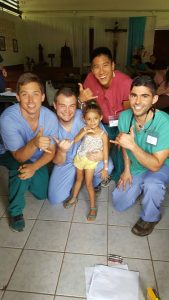 My ISL experience in Costa Rica was valuable to me for many reasons. I got to put into practice the clinical skills I learned in my first year of medical school, such as obtaining a patient history and performing a general physical exam. This was particularly rewarding and exciting because it was my first interaction with patients as a medical student. More importantly, many of the patients we saw were in such need, and I am extremely grateful for the opportunity to utilize my training for people who otherwise did not have the means to see a medical professional.
My ISL experience in Costa Rica was valuable to me for many reasons. I got to put into practice the clinical skills I learned in my first year of medical school, such as obtaining a patient history and performing a general physical exam. This was particularly rewarding and exciting because it was my first interaction with patients as a medical student. More importantly, many of the patients we saw were in such need, and I am extremely grateful for the opportunity to utilize my training for people who otherwise did not have the means to see a medical professional.
Our team set up clinics in local churches and provided free medical service to the people in nearby towns. The day before we opened the clinics, we performed house visits through the neighborhoods. The house visits were especially unforgettable and truly eye-opening because we were able to observe their living conditions first hand. Many of the families we visited were extremely poor, and most of the homes were made of sheet metal and without any flooring. However, the most humbling and inspiring thing about the people we encountered was that they maintained a positive attitude and a spirit of joy, regardless of their situation. They expressed gratitude to us for assisting them in any way we could, whether that was providing medical care or even helping them clean up their beaches from pollution. Although my time spent in Costa Rica was short, I hope that our impact made a difference in the lives of those we worked with, and I know that the perspective I gained will last with me forever.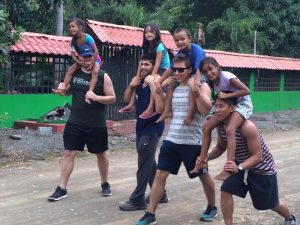
Thanks to my ISL experience, I am considering pursuing my Masters in Public Health following my residency training so I can be a more influential voice in the global health system. My wife and I plan on continuing our global health efforts and are motivated to pursue additional medical mission trips in the future.
Melissa Francois currently lives in the “Empire State,” New York. She received both her Bachelors of Science in Human Biology and Masters of Public Health from the University at Albany. In her free time she loves writing, arts & crafts, all things D-I-Y, traveling and learning new languages! She served on a Global Health team with ISL in 2015.
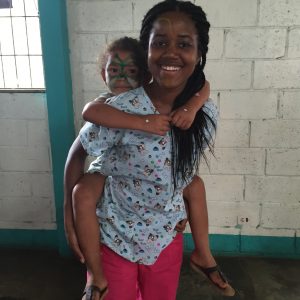 The summer after graduating college, I traveled to Costa Rica as a Global Health Volunteer with International Service Learning. As a pre-med student, I spent the greater part of my final semester of college vacillating between enrolling in a masters of public health program or entering the workforce before applying to medical school. For me, volunteering in Costa Rica provided me with the unique opportunity gain firsthand clinical experience while simultaneously exploring my interests in global health.
The summer after graduating college, I traveled to Costa Rica as a Global Health Volunteer with International Service Learning. As a pre-med student, I spent the greater part of my final semester of college vacillating between enrolling in a masters of public health program or entering the workforce before applying to medical school. For me, volunteering in Costa Rica provided me with the unique opportunity gain firsthand clinical experience while simultaneously exploring my interests in global health.
Upon landing in Costa Rica’s capital, San Jose I was quickly greeted by my group leader Abdi, who was holding an ISL sign. The palm trees swayed in the breeze of the evening as my fellow team members arrived at the airport one by one. Our group included several other pre-health students and a few first-year medical students. After everyone arrived we took a quick ride to Casa de Espiritualidad Franciscana, a picturesque monastery with a lush garden full of mangoes, limes, and other fruit. The next morning the “sisters” prepared breakfast using the ripe fruit from the garden while our group spent time getting to know each other. Later on we spent time brushing up on tropical diseases like dengue, chikungunya and tinea versicolor in preparation for the start of clinic.
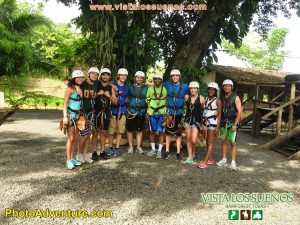
Nothing in my past experiences could have prepared me for my time spent in clinic in villages across Costa Rica. Volunteering at hospitals in the United States often came with many restrictions limiting the level of interaction volunteers could have with patients. I was thrilled to be able gain such hands-on experience during my time volunteering in Costa Rica.
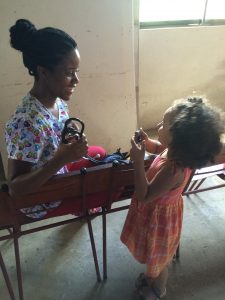
As a group we spent the coming weeks traveling to different villages to set up triage centers, gather medical histories, take vital signs, and were even able to help conduct physical exams under the guidance of a physician! I was extremely grateful to be able to ask the attending physicians questions about treatment, plan of care, and health policy in Costa Rica in real time. My experience at clinic provided me with the invaluable experience of working with a clinical team and caring for patients in underserved communities. Outside of volunteering we were also able to experience the true meaning of ¡Pura Vida!, spending time visiting the National Park to admire the tropical landscape and snap pictures with howler monkeys, and even go zip lining. Ultimately I was able to confirm my desire to pursue medicine and deepen my interests global health, all while experiencing the rich culture of Costa Rica and making new friends.
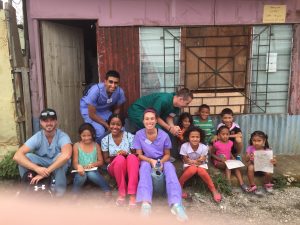
My experience in Costa Rica provided me with unique insight into global health and helped solidify my desire to pursue graduate education in public health. As a result of my volunteer experience with International Service Learning, I was able to return to the United States equipped to relate my coursework in social and behavioral health, and health policy, to my real-world experiences in Costa Rica. International Service Learning gave me the opportunity to explore the multidisciplinary health challenges faced by global communities, and I look forward drawing upon such experiences in order improve the health outcomes of underserved and vulnerable populations around the world.
Alumni Quotes:
“My ISL trip to Costa Rica was a truly life-changing experience. Being able to learn about a country and their poorer areas is eye-opening and makes you truly appreciate what you have. By working with the wonderful communities, not only was I able to assist in providing medical care but was able to meet some amazing people. Part of my heart has been left in Costa Rica, and I will always fondly remember my time there. I am so grateful to ISL for providing me with this opportunity.”
Kelly H., Indiana University
“My experience in Costa Rica was an ideal opportunity for my first medical mission trip. The experience of cultural immersion is something so valuable, it has truly transformed my outlook on life and my own culture. I traveled with 15 intelligent, strong, and confident health care professionals (RN’s, RN students, NP’s, NP students, Nurse educators, and nurse education students) and with all we have to offer, I would argue we took home more than we gave.”
Lauren Stacy, Rivier University
Alumni Video Testimonials:
Team University of South Carolina (USC) traveled to Costa Rica in March 2025.
Following is their video testimonial … enjoy
In the News:
During January break 2025, 16 junior nursing students from Saint Anselm College (Manchester, New Hampshire) traveled to Costa Rica with two faculty members for eight days providing much needed care to two underserved communities. The trip was part of the NU449 Community and Public Health Clinical, a global seminar that combines a short travel experience with a credit-bearing course. St. Anselm College’s Communication and Marketing Department recently published an article specific to their service learning trip … read it here: Nursing Students Provide Care to Underserved in Costa Rica
Costa Rica's Staff
We love our staff and we are positive that you will too! Each staff member is professional, courteous, and has the same passion as you do: to serve others.

